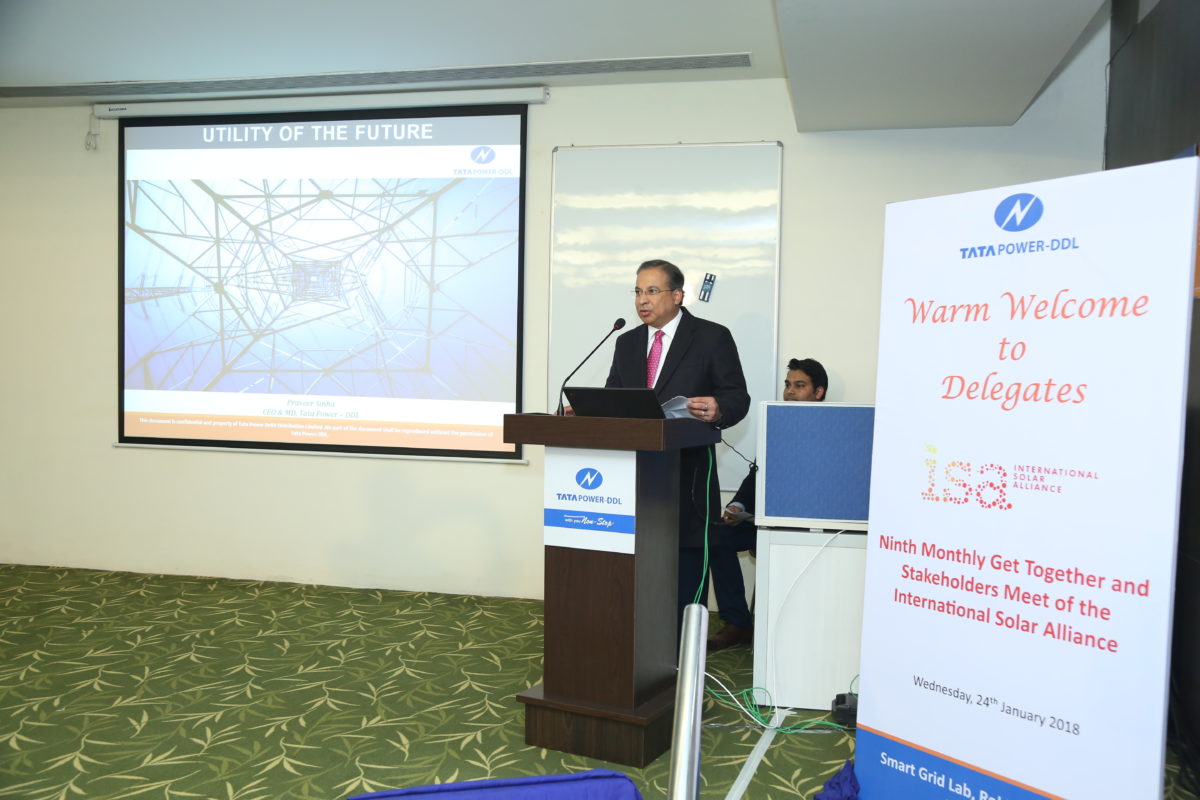To encourage renewable energy development in India, Tata Power Delhi Distribution Limited (TPDDL) is in the process of starting the Tata Smart Energy Incubation Hub, the purpose of which is to incubate startups and support them both financially, and with other resources, to conduct work in the area of smart energy.
pv magazine attended virtually, via a live broadcast.
Pravir Sinha, CEO and MD, TPDDL, provided an insight into the company’s developments in the solar sector at the 9th International Solar Alliance (ISA) stakeholder meeting. Elaborating on the Smart Grid lab, which has been built by TPDDL, Sinha said its purpose is to address grid challenges, and how distributed energy sources can connect to grids.
Sinha also highlighted how technological advancements are occuring in the grid sector, and how they are changing the gambit of electricity. He spoke on the critical challenges faced by urban and rural areas in the power sector.
The TPDDL, in collaboration with institutes like the Massachusetts Institute of Technology (MIT), Comillas Madrid and the World Bank, is working on the report for distributed energy and solutions for grid issues of the grid. It is supported by the Tata Trust, the Rockefeller Foundation, and the Shell Foundation. The first part of the report has been completed, while a second part is in progress, and is expected to be completed by the end of this year.
Electrification
Sinha emphasized that 20% of the world’s population is still not electrified and thus, there needs to be a paradigm shift in the way electricity is produced and distributed. He said more work needs to be done in the aeras of retail, micro-grids, mini-grids and other solutions, to help people in the remotest parts of the world gain access to electricity.
Furthermore, he mentioned the need to find different business models that are compatible with current tariffs, since it is not feasible for utilities to buy power at INR 10 ($0.157)/kWh, and supply at INR 3-4 ($0.047-0.063)/kWh. Solar costs are coming down, and thus it will also affect storage costs.
Utility in the Box
A project called Utility in the Box has been unveiled, which is said to provide all necessary energy solutions. The initiative is a solution implemented in mini grids, in order to achieve last mile connectivity. It is a metering and load management system, which also consists of features like on -bill financing and mobile money gateway integration. It is projected that the project will help to bring down the cost of power, because large storage systems are still expensive and not affordable for everyone.
Sinha further discussed Tata’s initiatives regarding distributed energy resources. Overall, Tata aims to scale its solar rooftop portfolio to 400-450 MW by 2025. To date, TPDDL has added 15 MW worth of solar rooftop systems under India’s net metering regulations.
In Assam and Arunachal Pradesh, successful project management is carried out by the company for off-grid projects. It has also successfully installed 668 kW worth of solar systems at five locations in Rashtrapati Bhavan, the official residence of the President of India.
Sinha said that the company is also working with different partners to utilize different battery capacities, including: Lead Acid with Ecoult; Sodium ion batteries with Aquion; Lithium-ion batteries with Panasonic; Lead Acid batteries (Gel based) with Exide; and standard Lead Acid batteries with Amara Raja.
Finally, Tata Power DDL is working on a 10 MW Battery Energy Storage System (BESS) pilot project with Applied Energy systems (AES) and the Mitsubishi Corporation; and is said to be installing microgrid projects in Bihar. No further details on the projects were unveiled, however.
This content is protected by copyright and may not be reused. If you want to cooperate with us and would like to reuse some of our content, please contact: editors@pv-magazine.com.








By submitting this form you agree to pv magazine using your data for the purposes of publishing your comment.
Your personal data will only be disclosed or otherwise transmitted to third parties for the purposes of spam filtering or if this is necessary for technical maintenance of the website. Any other transfer to third parties will not take place unless this is justified on the basis of applicable data protection regulations or if pv magazine is legally obliged to do so.
You may revoke this consent at any time with effect for the future, in which case your personal data will be deleted immediately. Otherwise, your data will be deleted if pv magazine has processed your request or the purpose of data storage is fulfilled.
Further information on data privacy can be found in our Data Protection Policy.